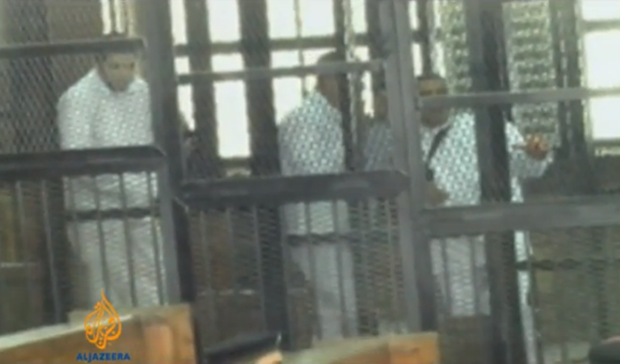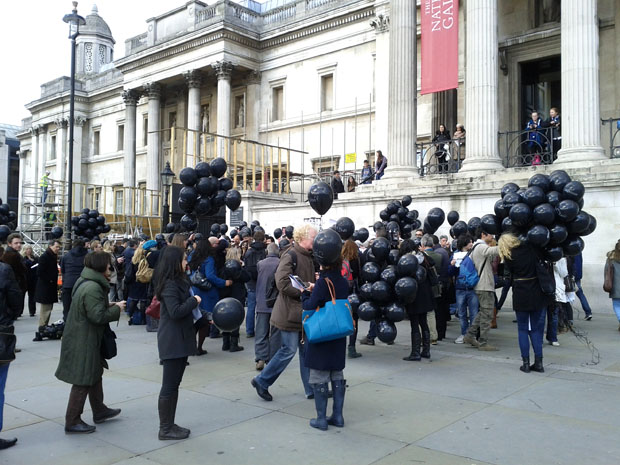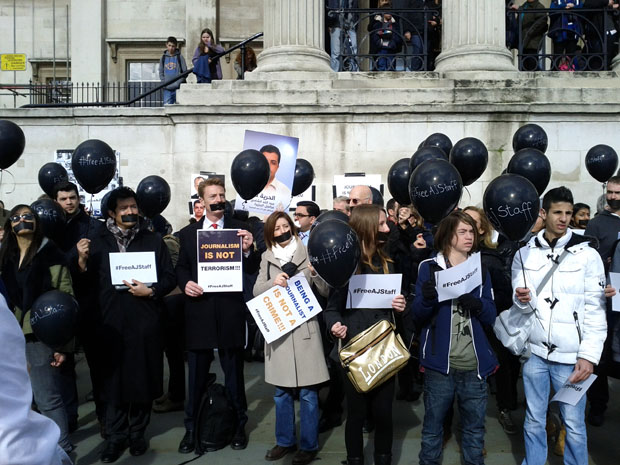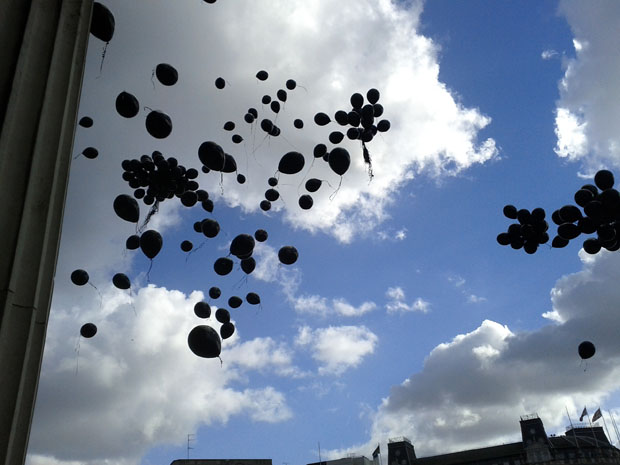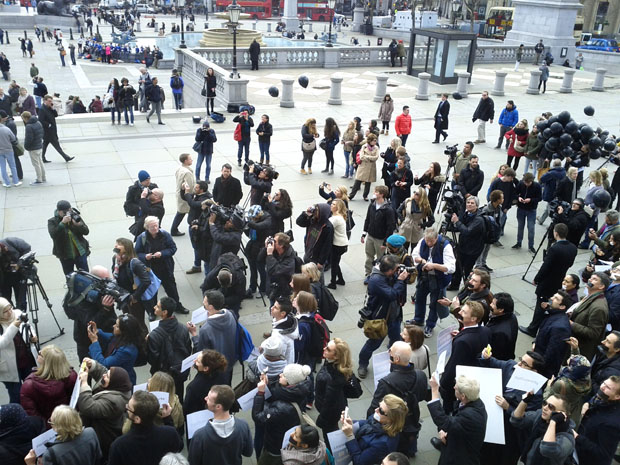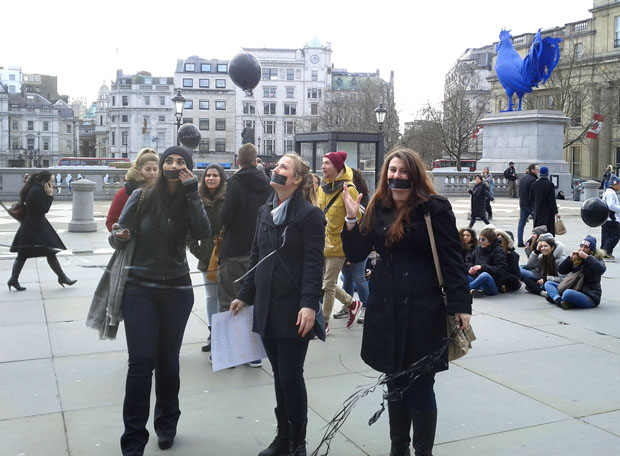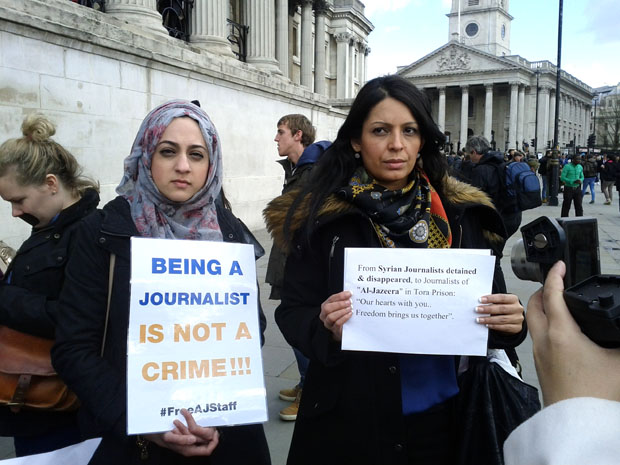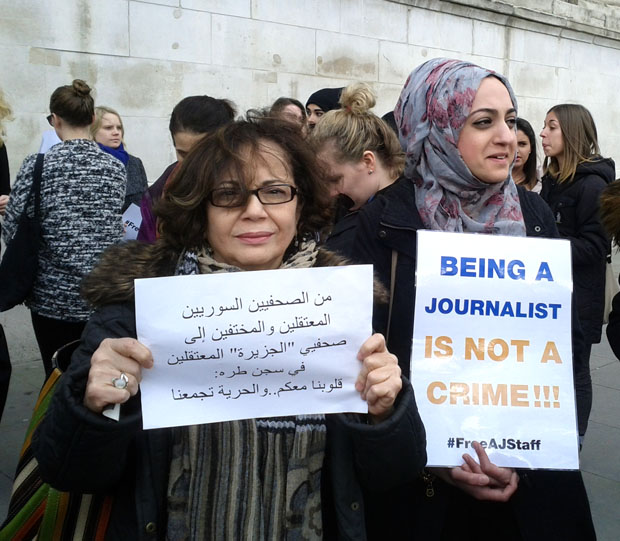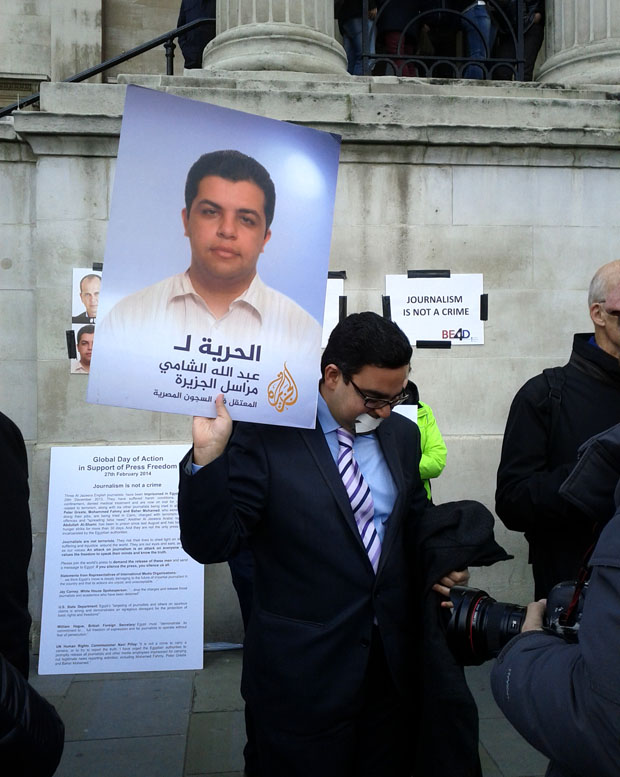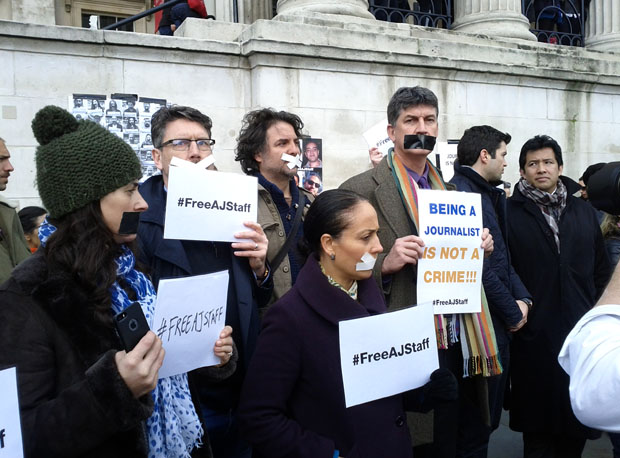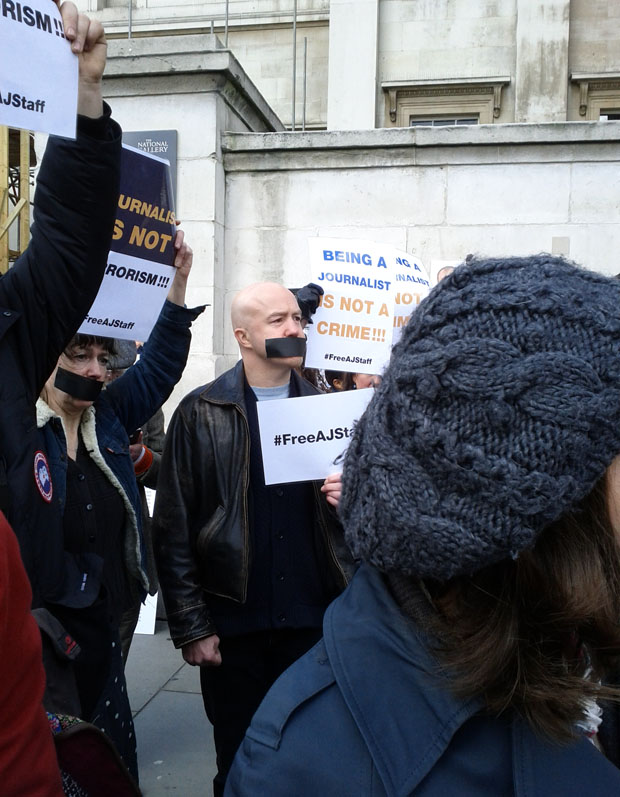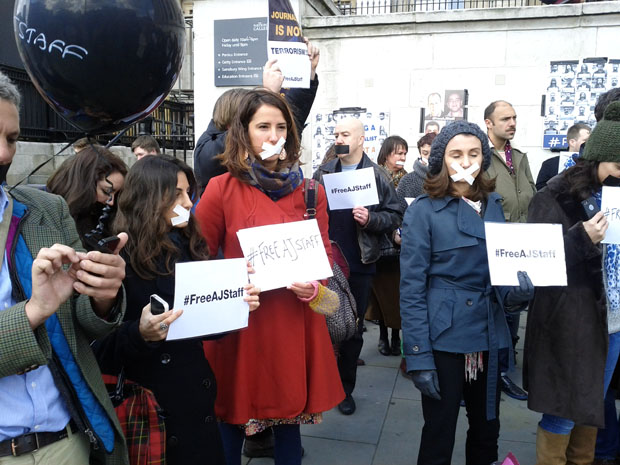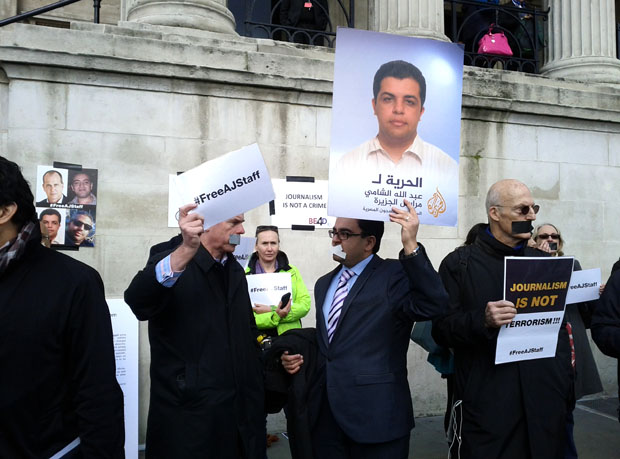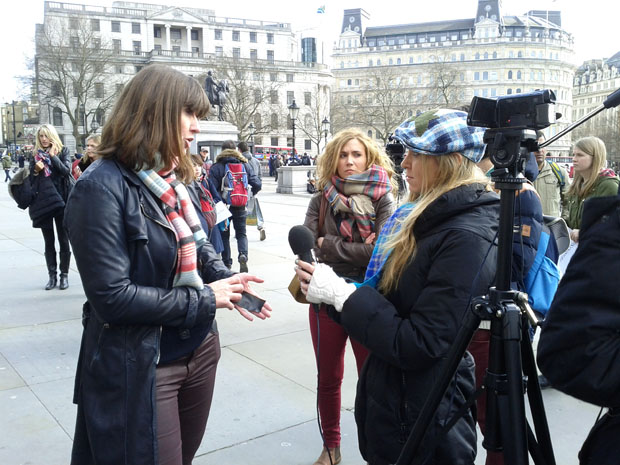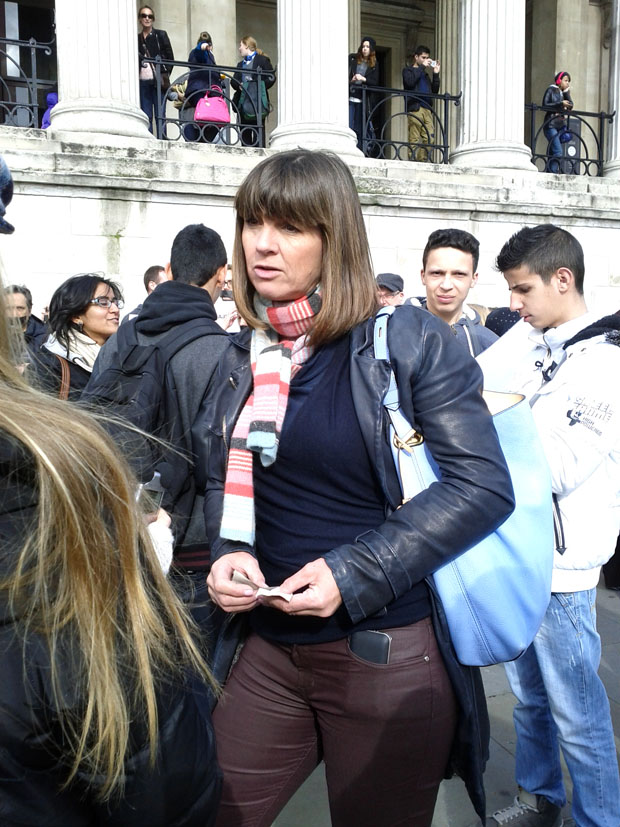Egypt’s message to journalists: “Adhere to the official narrative or risk severe punishment”
In a heavy blow to press freedom in Egypt, three Al Jazeera English (AJE) journalists were convicted Monday on charges of spreading false news, aiding a terrorist organisation and endangering national security.
Australian award-winning journalist Peter Greste and Canadian-Egyptian national Mohamed Fahmy, AJE Cairo Bureau Chief, were handed down seven-year jail sentences each. A third AJE journalist, Baher Mohamed, was meanwhile, sentenced to ten years — three more than his colleagues, on an additional charge of possessing an empty bullet case. The three journalists have been in detention since December and have steadfastly denied the charges against them.
Ten defendants in the same case — including three foreign journalists — were sentenced to 10 years in absentia, while three others — including Anas El Beltagui, son of jailed Muslim Brotherhood leader Mohamed El Beltagui — were acquitted.
The rulings shocked and outraged journalists and rights activists around the world, fuelling concern about freedom of expression and the independence of the judiciary in Egypt, three years after the country witnessed a mass uprising that toppled the authoritarian regime of Hosni Mubarak, raising hopes of greater freedoms.The unexpectedly harsh verdicts also sent a chilling message to journalists working in Egypt that the government was adamant on pursuing its zero-tolerance approach to dissent and that journalists are not immune from the authorities’ policy of silencing critics at any cost.
Sherine Tadros, an Egyptian journalist and former AJE reporter denounced the verdict in a Twitter post shortly after it was pronounced, saying: “As a friend of the jailed journalists, I feel incredibly sad; as a journalist, I am scared and as an Egyptian, I’m ashamed.”
“The ruling sends a clear message to journalists to adhere to the official narrative or risk severe punishment,” an Egyptian broadcaster who spoke on condition of anonymity, told Index after the verdict.
Meanwhile, in an interview on Al Jazeera shortly after Monday’s court session, Amnesty International director Steve Crawshaw deplored what he called an “outrageous ruling”, adding that the verdict was another step in Egypt’s “campaign of terrorizing people and terrorizing the media”.
Since Islamist President Mohamed Morsi was deposed on 3 July, dozens of journalists have been detained in Egypt as part of a massive government crackdown on dissenters of all stripes: Muslim Brotherhood leaders and supporters, secular activists and journalists.The release this week of two journalists — including Abdulla El Shamy, a reporter for the Al Jazeera Arabic Channel who had been held in detention since mid August — had raised hopes that at least 14 other journalists still in detention, would also be acquitted. The judge’s decision to prolong the detention of the AJE journalists however, has raised questions about the new government’s commitment to democratic principles.
“Today’s verdict is deeply disappointing. The Egyptian people have over the past three years, expressed their wish for Egypt to be a democracy. Without freedom of the press there is no foundation for democracy,” Britain’s ambassador to Egypt, James Watt, told Reuters after the verdict.
In the past eleven months, journalists covering “anti-coup” protests staged by Muslim Brotherhood supporters have allegedly been deliberately targeted by security forces and pro-government mobs who accuse them of being “paid agents” and “spies”. Since the Islamist president’s ouster last July, five journalists have been shot dead and several others wounded by riot police while reporting on the clashes between protesters and security forces, prompting an outcry from rights groups. In a statement released in April, the Cairo-based Arab Network for Human Rights Information denounced the increased attacks on journalists and called on the Press Syndicate and media outlets to ensure their protection. The New York-based Committee for the Protection of Journalists which ranked Egypt among the three “most deadly” countries for journalists in a 2013 report, also called on the Egyptian government to investigate the assaults on journalists and hold the perpetrators of such crimes to account. The calls came in response to the death of Mayada Ashraf, a 22 year old reporter who worked for the privately-owned Al Dostour newspaper. She became Egypt’s latest journalist-fatality when she was shot in the head on 28 March while covering the dispersal of a Muslim Brotherhood protest in Cairo.
Several Egyptian journalists have in recent months, complained of intimidation. They said they had received threats from security agents or were subjected to smear campaigns aimed at tarnishing their reputation. In today’s repressive, deeply polarised climate in Egypt, many local journalists have decided to “play it safe” adopting the state narrative and persistently vilifying the Muslim Brotherhood while lionising the military and the new president.
Not surprisingly, there has been little sympathy for the jailed AJE journalists in the Egyptian press. Out of fear of being labelled “unpatriotic” by the public or suffering an even worse fate, most local journalists have either remained silent on the AJE case or taken a stand against the defendants, referring to them as part of a “Marriott Cell” and implying they were “traitors” who had been working to sabotage the country. Some of the guests interviewed by talk show hosts on state-influenced media channels recently, have echoed the prosecution’s argument that “channels like Al Jazeera brought down Iraq and were planning to do the same in Egypt”. In the wake of Monday’s court rulings, it is highly likely that the current trend of journalists practicing self-censorship will continue.
After Monday’s verdict, Egyptian State Television reported that Foreign Minister Sameh Shoukry had forcefully rejected pressure from foreign governments to overturn the court decision. On a visit to Cairo the day before, US Secretary of State John Kerry had reportedly raised the issue of media freedom in talks with the country’s new President Abdel Fattah El Sisi. Kerry who had expressed concern about the jailing of journalists in Egypt, reacted to the verdict Monday by calling it “chilling and draconian”.
Meanwhile, rights activists also expressed alarm at the outcome of Monday’s court proceedings, calling the trial “political”.
“The charges against the journalists are politicised,” said Mohamed Lotfy, a rights activist who has worked as a researcher with Amnesty International. “The AJE journalists are pawns, caught in the middle of a political dispute between Qatar and Egypt.”
The Egyptian authorities are angry over Qatar’s continued support for the Muslim Brotherhood, delcared by Egypt a “terrorist organisation” last December. The Egyptian government has also accused the Qatari-funded Al Jazeera network of bias in favour of the outlawed group — an accusation that has been repeatedly denied by the network.
While most activists are “appalled” by Monday’s verdicts and have laid the blame on what they call a “highly politicised judiciary”, Sahar Aziz, an Associate Professor of Law, Texas A&M University, told Index she believes judges in Egypt are themselves “victims” of the country’s turbulent political transition.
“There is evidence that some judges are under indirect pressure from the executive branch to adjudicate these political cases in ways that legitimise the official narrative that the state is facing a threat to its national security,” she said, adding that “Over the past year, a group of judges reputed to be independent have been expelled from the judiciary through ‘voluntary retirement’ or in other settlements with the governing judiciary apparatus. This has sent a chilling message to other judges that the cost of truly independent adjudication is prohibitively high.”
But the government’s piling pressure on the judges meant little to family members of the jailed journalists who were stunned by the ruling.
“It is shocking. We were totally unprepared for this,” said Andrew Greste, Peter’s brother who had expected Peter to fly back to Australia with him where his elderly parents were eagerly awaiting their son’s return. “Obviously, it will take some time to rethink our plans and decide what we can do next,” he told journalists outside the courtroom.
Mohamed Fahmy’s fiancee Marwa, who attended the court session, broke down crying on hearing the verdict. The couple had been planning their wedding in April.
Wafaa Bassiouny, Fahmy’s mother, shouted out as she walked out of the courtroom, “What has my son done to deserve this? He was just doing his job. He is now unable to move his right arm, isn’t that enough?”
Fahmy has been denied adequate medical treatment by prison authorities for a shoulder injury sustained before his arrest and has now lost full use of his right arm
But all hope is not lost. It is still highly likely that through an appeals process, the sentence may be reduced, or the journalists may even be acquitted at a later date. Only by recognising justice and reversing its current course, can the new government in Egypt gain credibility in the eyes of the international community and win the backing and solidarity it badly needs.
This article was posted on 24 June, 2014 at indexoncensorship.org

